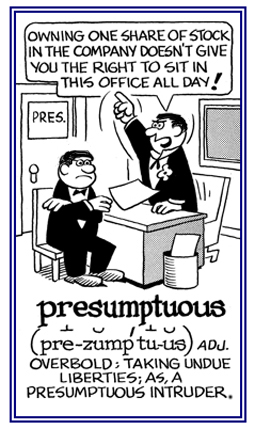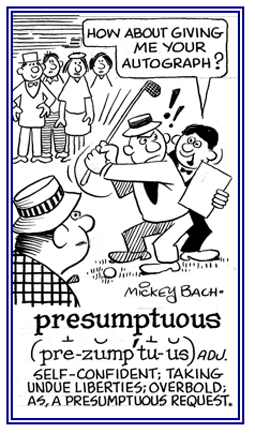em-, emp-, empt-; sump-, -sum-
(Latin: a taking, to take, to take up, to buy, to select; to use, to spend, to consume)
The replacement of one thing for something else: Many radio listeners complained about the excessive preemptions that were taking place instead of the regular programs.
preemptive (adjective), more preemptive, most preemptive
presume (verb), presumes; presumed; presuming
1. To accept that something is virtually certain to be correct even though there is no proof of it on the grounds that it is extremely likely; to expect; to think to be a fact: Agatha assumed, supposed, or presumed that her children were at school since it was Monday and not Sunday!
Since Mark's firm is prosperous and his work has been very good, he presumes that he will be getting a raise very soon.
2. To behave so inconsiderably, disrespectfully, or over confidently as to do something without being entitled or qualified to do it; usually used in a negative sense: Sarah's fiancé presumed to be very important, bold, and shameless in her mother's home!
1. The action of taking upon oneself of more than is warranted by one's position, right, or ability; forward or over-confident opinion or conduct; arrogance, pride, effrontery, assurance: Little Timmy had the presumption to answer the principal's question in quite a nasty and insolent way.
2. The assumption of taking something for granted, also that which is assumed to be, or to be true, on probable evidence; a belief deduced from facts or experience; assumed probability, supposition, expectation: Mr. Timmons made his presumptions of the issue at hand before he knew all the information concerning the circumstances of the problem.
3. In law, the inference of a fact not certainly known: The statement that James was guilty was just a presumption because not all the details concerning the case were known and proven.
4. In law, the assumption of the truth of anything until the contrary is proved or an inference established by the law as universally applicable to certain circumstances: The presumption that a defendant is innocent of committing murder is given until he or she is proven guilty.
5. A reason for believing; likely evidence: The presumption that Tom kicked his ball through the neighbor's window was probable because he was playing ball in his backyard at the time when the neighbor's window was broken!
2. The assumption of taking something for granted, also that which is assumed to be, or to be true, on probable evidence; a belief deduced from facts or experience; assumed probability, supposition, expectation: Mr. Timmons made his presumptions of the issue at hand before he knew all the information concerning the circumstances of the problem.
3. In law, the inference of a fact not certainly known: The statement that James was guilty was just a presumption because not all the details concerning the case were known and proven.
4. In law, the assumption of the truth of anything until the contrary is proved or an inference established by the law as universally applicable to certain circumstances: The presumption that a defendant is innocent of committing murder is given until he or she is proven guilty.
5. A reason for believing; likely evidence: The presumption that Tom kicked his ball through the neighbor's window was probable because he was playing ball in his backyard at the time when the neighbor's window was broken!
presumptive (adjective); more presumptive, most presumptive
1. Relating to something or someone that gives reasonable grounds for belief and warrants inference: Tom, the driver of the car, had a high alcohol concentration in his blood which was presumptive evidence that he was drunk while driving.
2. Pertaining to an individual or something that is based on deduction; credible, likely: Greg Smith Jr. seems to be the presumptive hier of his father's company.
2. Pertaining to an individual or something that is based on deduction; credible, likely: Greg Smith Jr. seems to be the presumptive hier of his father's company.
presumptively (adverb) (not comparable)
Pertaining to how something is reasonably assumed; presumably: Jack was presumptively late getting started on his trip because he missed his train!
presumptuous (adjective); more presumptuous, most presumptuous
1. Characterizing unduly confidence or boldness in opinion or conduct in a way that is arrogant, impertinent, or rude: Mac was giving presumptuous advice to his supervisor about how the project should be done.
2. Relating to the action of doing something without permission or which is not proper, or done for a good reason: The student's presumptuous interruptions by asking the teacher questions before she was able to finish explaining the exercise was more disruptive than helpful in understanding it.
3. Etymology: from Latin praesumptuosus and praesumere, "to take beforehand, presuppose"; from prae-, "before (in time and place) + sumere, "to take"; which is a compound of sub, "under" + emere, "to take".

© ALL rights are reserved.

© ALL rights are reserved.

© ALL rights are reserved.
Go to this Word A Day Revisited Index
2. Relating to the action of doing something without permission or which is not proper, or done for a good reason: The student's presumptuous interruptions by asking the teacher questions before she was able to finish explaining the exercise was more disruptive than helpful in understanding it.
3. Etymology: from Latin praesumptuosus and praesumere, "to take beforehand, presuppose"; from prae-, "before (in time and place) + sumere, "to take"; which is a compound of sub, "under" + emere, "to take".



Go to this Word A Day Revisited Index
so you can see more of Mickey Bach's cartoons.
presumptuously (adverb) (not comparable)
Relating to how a person behaves beyond what is right or proper; excessively forward and confident or bold in opinion or conduct in a way that is arrogant, impertinent, or rude: Sam was presumptuously advising his supervisor about how to complete the new contract.
The conduct of a person which is pushy, arrogantly self-confident; forwardness: Jack had the presumptuousness or audacity to question the reasonable decision made by the principal of the school.
1. In computer science, a symbol or message that appears on the computer screen to indicate that the computer is ready to receive a command or which requests action from the user; such as, "Enter Password" or "Press the Button to Continue".
2. Something that is done at once and without delay.
3. Being ready, punctual, or quick to act.
4. Etymology: from the mid-14th century, from Old French prompt, which came from Latin promptus, "brought forth, at hand, ready, quick"; from promere, "to bring forth"; from pro-, "forward" + emere, "to take".
2. Something that is done at once and without delay.
3. Being ready, punctual, or quick to act.
4. Etymology: from the mid-14th century, from Old French prompt, which came from Latin promptus, "brought forth, at hand, ready, quick"; from promere, "to bring forth"; from pro-, "forward" + emere, "to take".
prompt (adjective), prompter, promptest
1. Being on time; being punctual: "She was always the promptest worker on the job even though her co-worker tried to be prompter."
2. Carried out or performed without delay: "He responded with a prompt acknowledgement."
2. Carried out or performed without delay: "He responded with a prompt acknowledgement."
prompt (verb), prompts; prompted; prompting
1. To cause someone to act or to make a person decide to do something: "Fortunately, she was prompted to change her mind about going on the trip."
2. To cause something to happen.
3. To provide actors during a performance with words or lines they have forgotten: "The actor had to be prompted often in the first scene of the play."
4. To indicate or to suggest something which a person should say, or to give a reminder to a speaker.
5. Etymology: from Latin promptus, literally, "brought forth", and so, "visible, apparent, evident, manifest" from the past participle of promere, "to take or to bring out or forth"; from pro-emere, from pro-, "before, forward + emere, "to take".
2. To cause something to happen.
3. To provide actors during a performance with words or lines they have forgotten: "The actor had to be prompted often in the first scene of the play."
4. To indicate or to suggest something which a person should say, or to give a reminder to a speaker.
5. Etymology: from Latin promptus, literally, "brought forth", and so, "visible, apparent, evident, manifest" from the past participle of promere, "to take or to bring out or forth"; from pro-emere, from pro-, "before, forward + emere, "to take".
Prompte et sincere. (Latin expression)
Translation: "Prompt and sincere."
Motto of Calvin Theological Seminary, Grand Rapids, Michigan, USA.


